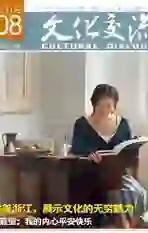古镇里的老酒坊
2018-08-06王晖
王晖
一
2018年4月5日,清明节。裘小宇一早就来到自家的酒坊。这一天是嵊州崇仁古镇裘氏家庙祭祖的大日子。小宇在酒坊的角落里翻出两坛自家酿制的陈年冬酿。他家的手工冬酿黄酒质量上乘,年年脱销,以至于自己都没有存下来多少。只有在重要场合,小宇才肯把家里的陈酿拿出来用。手工冬酿是裘氏祭祖指定黄酒,小宇细心拂去酒坛上的灰,盖上红布,准备挑到古镇里的裘氏家庙参加祭祖大典。
酒坊里酒香四溢。一星期前,第一批去年的冬酿新酒刚刚封坛,接下来还有好几批。本来面积就不大的酒坊里堆满了酒坛。从去年冬至到今年春分,这一批冬酿的酿制过程十分顺利,酒的品质也非常好,小宇心里绷着的弦总算是松了下来,接下来可以休息一段时间了。但小宇闲不住,他身后堆放着刚从附近村子里收来的稻草,打算空闲下来的时候编一些缸衣,把车间里那些陈旧的换一批下来。
就算在黄酒之乡绍兴,像老裘家这样采用纯手工酿制、一年只生产一季冬酿的酒坊也已经不多,这些年更是几乎看不到。酿了一辈子酒的老裘对酒的品质十分看重,而小宇则考虑得更多一些——怎样在坚持传统手艺的基础上,拓宽经营思路,让酒坊有个长远的良性发展。
上个星期,镇上的文化站站长到酒坊来收集整理一些资料,打算今年为他们家申报市级非物质文化遗产,按条件,裘家酿酒技艺已经传承了100多年,完全够格。小宇想着,等非遗项目批下来,就把“裘氏家酒”的牌子打出去。
二
冬至前一个月,老裘一家就开始忙碌起来。
南方的冬天总是来得不够坚决,几场蜻蜓点水般的冷空气过后,才渐渐有点冬天的样子。听着西北风在酒坊的横梁间呼呼吹过,阳光拖在地上的影子一天比一天长——酿酒人知道,手工冬酿最佳的时间就要到来了。
但预定的米还没有到,小宇心里不免焦急。开酿前要先浸米,这一般需要15-20天。他忙着跟米商联系,确定送米的时间。小宇家酿酒用的糯米是从安徽、江西那边的农户处直接采购的,“都是最好的新米”,小宇十分肯定地跟我说,“米不好酿出来的酒也不会好”。
老裘则不慌不忙,时不时到酒坊里转转,东摸摸西摸摸。他在等一个重要日子的到来。酒缸都已经清理出来洗干净了,烧火的用煤块也已经提前拉好,稻草编织的缸衣缸盖都修补过了,还有几把木耙需要加固一下。老裘心里有数。这个酒坊里的每一个角落,每一件家什,都跟刻在他心里一样。几十年来,这些东西都未曾改变。
转眼就到了冬至这一天。
老裘四点钟起床,扒下一碗水泡饭,早早就来到酒坊。虽然准备工作前几天就开始了,也检查了好几遍,确定已经没有任何纰漏。
小宇也随后赶到。他先给炉子生火,然后仔细检查大缸里浸泡的糯米。在水里泡了20来天的糯米已经有些轻微发酵,乳酸菌在其中缓慢生长,水面上形成了一道薄薄的膜和放射状的气泡。老裘在边上的储酒车间检查前期做好的酒酿,拿手指插到酒酿里,再放到嘴里尝一尝,觉得酒酿做得到位,就把小酒缸里的酒酿倒在一个大盆子里,方便等会儿糯米入缸搅拌时取用。
其他的帮工陆续到场。他们都是小宇的街坊邻居,酒坊平常是老裘和小宇两个在打理,只有在开酿和煎酒装坛需要人手的时候大家才过来帮忙。好在每年都是这几个帮工,大都熟门熟路,对各自的分工心中有数。
不用老裘、小宇分派工作,街坊邻居们一到就迅速进入了自己的工作状态,舀米的舀米,烧火的烧火,伴随着炉膛里飞溅的火星和蒸笼里滋滋冒出的热气,沉寂的酒坊车间里顿时活色生香地热闹了起来。
三
凌晨三点,我跟着老裘和小宇穿过古镇逼仄的巷子去酒坊开头耙。开头耙是整个手工冬酿过程中最重要的环节,这项工作一般都是老裘父子俩亲自完成。
天有些阴沉,只有巷子尽头的一盏路灯还摇摇晃晃地亮着。小宇推开酒坊大门,一股浓烈的酒味扑面而来。掀开缸盖,我大吃了一惊,只见白天搅拌了酒曲酒药的糯米饭,此刻在七石缸里竟像沸水般翻滾着,大量的气泡一刻不歇地从缸底冒上来、再冒上来。
“酿酒需要眼、鼻、耳、舌各方面综合判断。首先是闻,闻酒气;然后是听,听酒缸里醪液翻滚的声音”。老裘一边跟我说着,一边拿手指往醪液里戳一下,然后吮吸下手指,“最后是眼睛看和嘴巴尝,品尝醪液的甜度和酒精度”。一个有经验的酿酒师只要用这四步,就可基本掌握一缸酒的发酵程度。
裘家酒坊传到裘小宇这里,已经是第四代。
裘小宇的爷爷和太爷当年都是崇仁古镇周边方圆几十里有名的“耙头”师傅。老裘从小就跟着小宇他爷爷酿酒,自然也掌握了一门好手艺。稍长,老裘进了集体的崇仁酒厂工作。当年崇仁酒厂里的许多酿酒工具,还都是小宇的爷爷传下来无偿贡献的。那台民国三十一年的榨酒机,包括压酒袋的条石,都是小宇爷爷传下来的老古董,直到现在,酒坊还在使用。老裘自然也是酒厂的技术骨干,他至今仍津津乐道自己当年作为厂里的技术骨干,被指派到上虞的女儿红酒厂进行短期交流学习的经过。只是好景不长,周边的大酒厂都开始了工业化生产,单纯依靠手工一年只做一季冬酿的崇仁酒厂终于难以为继而关门大吉。这才有了老裘、小宇现在的酒坊。
“你儿子将来会来接你的班吗?”我问小宇。小宇眼里闪过一丝不易察觉的无奈,“那要看他自己的啦。”小宇的儿子现在在当兵,退役后还要继续读大学,回来接班的可能性不大。毕竟,手工酿酒这活又累又没有效率,年轻人愿意干的不多。
四
春分前后,冬已是强弩之末,春的到来无法阻挡。河岸边的柳树似乎是在一夜之间落光了叶子,又在一夜之间绽出了新芽。地气一天天回暖,也同时唤醒了酒坛里沉寂了两个多月的酒液。“阴极之至,阳气始生”。等到来年春暖花开的时节揭开酒坛的封口,一颗颗晶莹剔透的糯米已经变成了琼浆玉液。闻之沁人心脾,饮之甘甜微醺。佳酿已成。
小宇把酒坛里经过低温发酵糖化的醪液倒出来,开始了榨酒前的准备工作。
榨酒是一項体力活,是由小宇一个人来完成的。小宇将小酒坛里的醪液倒入大缸里,搅拌均匀,然后再用一个特制的底部开口的木勺,将醪液灌入一个圆柱状的布袋中,用箬壳扎口。这一袋醪液有三十多斤重,小宇单手提起,底下用另一个木勺一托,爬上梯子依次叠放到榨酒机中。长年的劳作,已经让小宇练就了超常的臂力。
新榨出来的生酒呈琥珀色,相比陈化的酒液,生酒里透着那么一股子“鲜”味。生酒存放时间不宜过长,酒里还有大量的微生物和菌群,须尽快进行高温杀菌,杀死酒里的微生物,破坏残余酶的活力,将酒中的各种成分固定。
最近几年,陆续有杭州、宁波等地的摄影师慕名而来,记录拍摄他们家的手工冬酿酿制过程,让裘家酒坊渐渐有了名声。摄影师们不遗余力地推介,大大拓展了老裘家冬酿的销售渠道。陆续有一些外地的客户过来购买他们家的酒,还有一家网店主动联系小宇,开始在网店上销售他们家的产品。
古老的行当似乎又看到了新的希望。
For Qiu Xiaoyu, winemaking is a matter of time. It is also a matter of heart and soul. In his eye, winemaking is never a matter of machine.
April 5 was the Tomb-sweeping Festival, and a big day for the wine-making Qiu family in the ancient town of Chongren, Shengzhou. It was a non-business day for the family. Qiu Xiaoyu took two jars of wine from the cellar, whisked away the dust and covered them with red cloth to get ready for an ancestor-worshipping ceremony to be staged at the familys ancestral temple.
Only a week before the celebration, the familys first winter brew had just been made ready for the finishing touch of the fermenting process; but Qiu Xiaoyu has been kept busy with chores, making hey when the sun shines and racking his brain to keep the 100-year-old family heirloom thrive against low-cost machinery production.
The family is one of the few family distillers still producing purely traditional, hand-made Shaoxing wine in this wine-scented town.
In todays machine-run world it still takes the combined force of human hands and the magic of time to make the worlds finest things. For the winemakers in Chongren and all the other old-fashioned distillers across Shaoxing, every wine-making season is like a narrative, a romantic cycle complete with a preface, flashbacks and an open ending.
It also takes the best rice to make the “elixir of life” live up to the standards set by the first generation of the wine-making family. The rice used in Qius brewery is purchased directly from the rice growers in Anhui and Jiangxi provinces. “We use the best rice we can find,” Xiaoyu shared proudly.
Qiu Xiaoyu took the family relay baton from his father, who learned the tricks from Xiaoyus grandfather and great-grandfather. He is now the fourth-generation winery owner of the family-run wine brand.
Like his father and grandfather and great grandfather, Qiu Xiaoyu has been steeped in the spirituous world for most of his life. The winemaker more than qualifies to be the ambassador to the towns signature wine brand and the unsung hero behind the enduring reputation of the towns hallmark local craft.
Running through his veins is not blood, but Shaoxing wine.
“You learn to smell and detect, just like a chef who needs to get everything under control without using his tongue. Having to actually taste the flavor means your skills arent up to par. Winemaking calls for prediction and the mastery of trends. You take action before it is too late.”
“Getting the temperature right is essential to making good Shaoxing wine. When it goes above body temperature, the wine becomes ‘old. When its too cold, its not preferable either. Back in the old days, there was no helpful technology such as thermometers. We used hands – and hands only – to tell the temperature throughout the whole process. You know, wine has its own mind and its own life. Its just like humans. What a strange thing it is!”
Born into a winemaking family in Chongren, Xiaoyus father is the uncrowned king of the towns time-honored wine-making artistry, and a personified testament to the longstanding legacy that defines the rice wine-making industrial pride of Shaoxing.
Xiaoyus grandfather and great grandfather were winemaking masters famed in Chongren Town. After years of working with his own winemaking father in the family winery, Xiaoyus father joined the Chongren Winery, where many winemaking tools were donated by Qius family and are still in use today, to eke out a livelihood, and soon became the mastermind of the factorys lifeblood. Later the father was sent to a winery in Shangyu, where the master further honed his skills.
“Do you expect your son to take the relay baton from you?” I asked.
“He is in the army, and plans to go to college after discharge from military service. I cant make the decision for him,” Xiaoyu explained lightly, his eyes sparkling with a tiny note of helplessness.
The reputation of the handmade wine crafted by the Qiu family has drawn in photographers from Hangzhou and Ningbo. The attention from journalists has helped promote the family winery in a wider region and created new sales channels.
